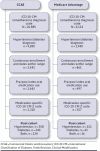Alignment of diagnosis and pharmacy claims data coding of medication adherence among patients with diabetes or hypertension
- PMID: 33769854
- PMCID: PMC10391116
- DOI: 10.18553/jmcp.2021.27.4.497
Alignment of diagnosis and pharmacy claims data coding of medication adherence among patients with diabetes or hypertension
Abstract
BACKGROUND: ICD-10-CM codes exist that facilitate provider designation of patients as "nonadherent to therapy"; however, it is unclear whether this label accurately reflects patient behavior according to widely accepted medication adherence metrics using pharmacy claims data. OBJECTIVE: To determine the extent to which patients are accurately coded for and have calculated rates of nonadherence using ICD-10-CM codes and claims, respectively. METHODS: This was a retrospective cohort study using commercial insurance and Medicare Advantage claims data from 2015 to 2016. The analysis focused on adults aged 18 years and older who had been diagnosed with and were being treated for hypertension and/or diabetes and had been coded as nonadherent by a provider during an outpatient encounter. Adherence (proportion of days covered [PDC]) to oral antihypertensive and/or antidiabetic therapy was calculated 6 months before and after the first nonadherence diagnosis identified in outpatient encounters, using 2 distinct calculation methods. Inferential statistics and multivariable logistic regression were used to determine predictors of coding agreement and changes in adherence after the nonadherence diagnosis controlling for available patient characteristics. RESULTS: A total of 1,142 patients who had been coded as nonadherent were identified, of which between 5.3% and 22.0% (depending on metric and condition) had PDCs before the nonadherence code deeming them adherent according to claims, conflicting with nonadherence diagnosis codes documented by their providers. Mean PDCs increased significantly (20.5%-24.3%, all P < 0.001) among both conditions following the nonadherent code, as did the proportion adherent (PDC > 80%), irrespective of disease (all P < 0.01). The odds of being correctly labeled nonadherent according to claims decreased with age (diabetes odds ratio [OR]: 0.82, 95% CI = 0.694-0.976; hypertension OR: 0.86, 95% CI = 0.773-0.944) but were higher among those taking more medications (diabetes OR: 2.97, 95% CI = 1.658-5.326; hypertension OR: 3.0, 95% CI = 2.095-4.305). Following the nonadherence coding, the odds of being adherent increased with age in both models (diabetes OR: 1.17, 95% CI = 1.012-1.363; hypertension OR: 1.13, 95% CI = 1.048-1.223) yet decreased with increasing medications (diabetes OR: 0.25, 95% CI = 0.138-0.468; hypertension OR: 0.47, 95% CI = 0.368-0.592) and were lower if the patient was observed to be nonadherent before the index encounter (diabetes OR: 0.33, 95% CI = 0.146-0.760; hypertension OR: 0.25, 95% CI = 0.152-0.423). CONCLUSIONS: In general, providers are properly classifying patients as nonadherent using ICD-10-CM codes, but additional assessment is needed to determine the reasons for the remaining mismatch between claims- and diagnosis-based nonadherence. In addition, the correct claims-based metric needs to be established to improve alignment with provider interpretation of patient medication use. DISCLOSURES: No outside funding supported this study. Gatwood reports grants from GlaxoSmithKline, Merck & Co., and AstraZeneca, outside the submitted work. Kovesdy reports consulting fees from Amgen, Sanofi, Fresenius Medical Care, Keryx, Bayer, Abbott, Abbvie, Dr. Schar, Astra-Zeneca, Takeda, Tricida, and Reata and grants from Shire, outside the submitted work. The other authors have nothing to disclose. Findings described in this article were presented as a poster at the American College of Clinical Pharmacy Annual Meeting in New York City, October 2019.
Conflict of interest statement
No outside funding supported this study. Gatwood reports grants from GlaxoSmithKline, Merck & Co., and AstraZeneca, outside the submitted work. Kovesdy reports consulting fees from Amgen, Sanofi, Fresenius Medical Care, Keryx, Bayer, Abbott, Abbvie, Dr. Schar, Astra-Zeneca, Takeda, Tricida, and Reata and grants from Shire, outside the submitted work. The other authors have nothing to disclose.
Findings described in this article were presented as a poster at the American College of Clinical Pharmacy Annual Meeting in New York City, October 2019.
Figures
Similar articles
-
Evaluating the relationship between quality measure adherence definitions and economic outcomes in commercial health plans: a retrospective diabetes cohort study.J Manag Care Spec Pharm. 2021 Jan;27(1):64-72. doi: 10.18553/jmcp.2021.27.1.064. J Manag Care Spec Pharm. 2021. PMID: 33377445 Free PMC article.
-
Factors associated with medication nonadherence among Medicare low-income subsidy beneficiaries with diabetes, hypertension, and/or heart failure.J Manag Care Spec Pharm. 2021 Aug;27(8):971-981. doi: 10.18553/jmcp.2021.27.8.971. J Manag Care Spec Pharm. 2021. PMID: 34337985 Free PMC article.
-
Closing the Gap: Identifying Rates and Reasons for Nonadherence in a Specialty Population.J Manag Care Spec Pharm. 2019 Nov;25(11):1282-1288. doi: 10.18553/jmcp.2019.25.11.1282. J Manag Care Spec Pharm. 2019. PMID: 31663457 Free PMC article.
-
A Comprehensive Review of Methods to Measure Oral Oncolytic Dose Intensity Using Retrospective Data.J Manag Care Spec Pharm. 2019 Oct;25(10):1125-1132. doi: 10.18553/jmcp.2019.25.10.1125. J Manag Care Spec Pharm. 2019. PMID: 31556821 Free PMC article.
-
Access to medications among adults with type 2 diabetes using pharmacy- or clinic-based medication assistance programs: A systematic review.J Am Pharm Assoc (2003). 2020 Nov-Dec;60(6):e411-e421. doi: 10.1016/j.japh.2020.07.001. Epub 2020 Aug 7. J Am Pharm Assoc (2003). 2020. PMID: 32778516
Cited by
-
Antihypertensive and Lipid-Lowering Medication Adherence in Young Adults With Youth-Onset Type 2 Diabetes.JAMA Netw Open. 2023 Oct 2;6(10):e2336964. doi: 10.1001/jamanetworkopen.2023.36964. JAMA Netw Open. 2023. PMID: 37792373 Free PMC article.
-
Adherence to Oral Antidiabetic Drugs in Patients with Type 2 Diabetes: Systematic Review and Meta-Analysis.J Clin Med. 2023 Mar 2;12(5):1981. doi: 10.3390/jcm12051981. J Clin Med. 2023. PMID: 36902770 Free PMC article. Review.
References
-
- Branham A, Moose J, Ferreri S. Retrospective analysis of medication adherence and cost following medication therapy management. Innovations in Pharmacy. 2010;1(1):article 12.
MeSH terms
Substances
LinkOut - more resources
Full Text Sources
Medical




